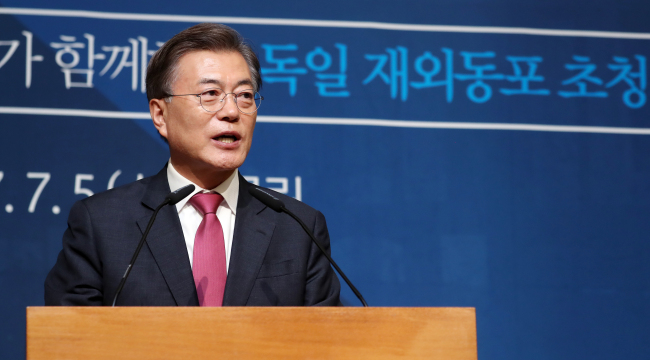Moon calls for compatriots’ support over peninsular affairs
By Korea HeraldPublished : July 5, 2017 - 20:08
BERLIN -- President Moon Jae-in on Wednesday appealed to South Korean compatriots in Germany for their support over the new government‘s policies on the Korean Peninsula and its responses to North Korea‘s military provocations.
The South Korean president, currently on an official visit to Germany’s capital ahead of his attendance to the annual Group of 20 summit in Hamburg, met with Korean expatriates over lunch on Wednesday, local time, at the Grand Hyatt Hotel.
The meeting was the first official event on Moon’s itinerary after landing at Berlin’s Tegel Airport.
“The greatest achievement from my visit to the US last week was that South Korea and the US have agreed to seek for a peaceful solution to the North Korea nuclear problem and a permanent peace in the peninsula,“ Moon said in the luncheon.
The South Korean president, currently on an official visit to Germany’s capital ahead of his attendance to the annual Group of 20 summit in Hamburg, met with Korean expatriates over lunch on Wednesday, local time, at the Grand Hyatt Hotel.
The meeting was the first official event on Moon’s itinerary after landing at Berlin’s Tegel Airport.
“The greatest achievement from my visit to the US last week was that South Korea and the US have agreed to seek for a peaceful solution to the North Korea nuclear problem and a permanent peace in the peninsula,“ Moon said in the luncheon.

Vowing to carry on such a stance in the upcoming G-20 summit, Moon urged Koreans to put their trust in his administration‘s effort to prioritize talks with the communist regime.
Moon referred to Germany‘s unique experience of achieving a peaceful unification with formerly communist East Germany in 1990.
“This place which was once a symbol of division and the Cold War has now become a beacon of peace and unification,” Moon said. “This should be our future as well.”
The South Korean leader also pledged to further reinforce the nation’s bilateral ties with Germany, focusing on partnership in the trade sector.
There are currently some 40,000 South Koreans residing in Germany, a considerable number of them being mine workers and nurses who migrated in the 1960 and the 1970s.
Upon the German government‘s request for economic support and manpower in the post-World War II era, a total of 7,936 miners and 10,563 medical nurses flocked from Korea to Germany between 1963 and 1976, of which some 3,300 are estimated to have stayed behind.
By Bae Hyun-jung
Korea Herald correspondent
(tellme@heraldcorp.com)
-
Articles by Korea Herald








![[Graphic News] More Koreans say they plan long-distance trips this year](http://res.heraldm.com/phpwas/restmb_idxmake.php?idx=644&simg=/content/image/2024/04/17/20240417050828_0.gif&u=)
![[KH Explains] Hyundai's full hybrid edge to pay off amid slow transition to pure EVs](http://res.heraldm.com/phpwas/restmb_idxmake.php?idx=644&simg=/content/image/2024/04/18/20240418050645_0.jpg&u=20240419100350)






![[From the Scene] Monks, Buddhists hail return of remains of Buddhas](http://res.heraldm.com/phpwas/restmb_idxmake.php?idx=652&simg=/content/image/2024/04/19/20240419050617_0.jpg&u=20240419175937)

![[KH Explains] Hyundai's full hybrid edge to pay off amid slow transition to pure EVs](http://res.heraldm.com/phpwas/restmb_idxmake.php?idx=652&simg=/content/image/2024/04/18/20240418050645_0.jpg&u=20240419100350)

![[Today’s K-pop] Illit drops debut single remix](http://res.heraldm.com/phpwas/restmb_idxmake.php?idx=642&simg=/content/image/2024/04/19/20240419050612_0.jpg&u=)